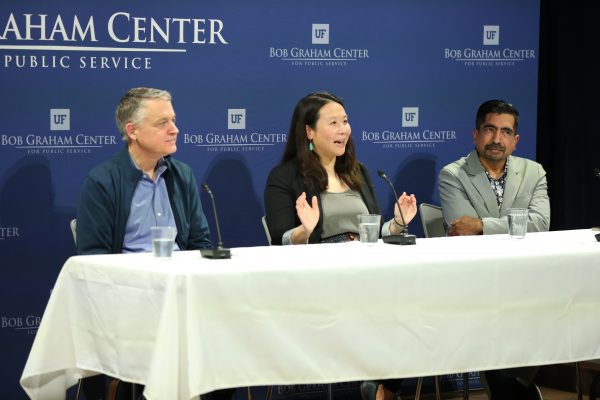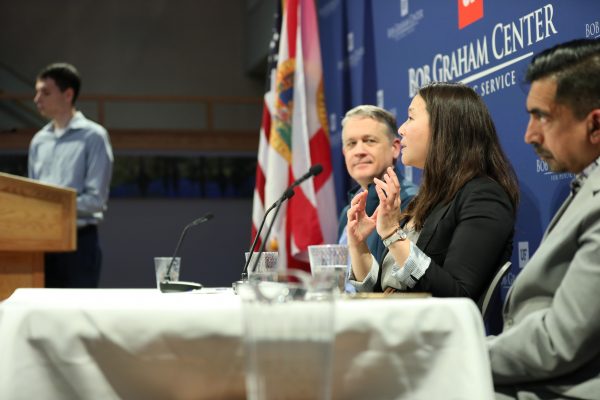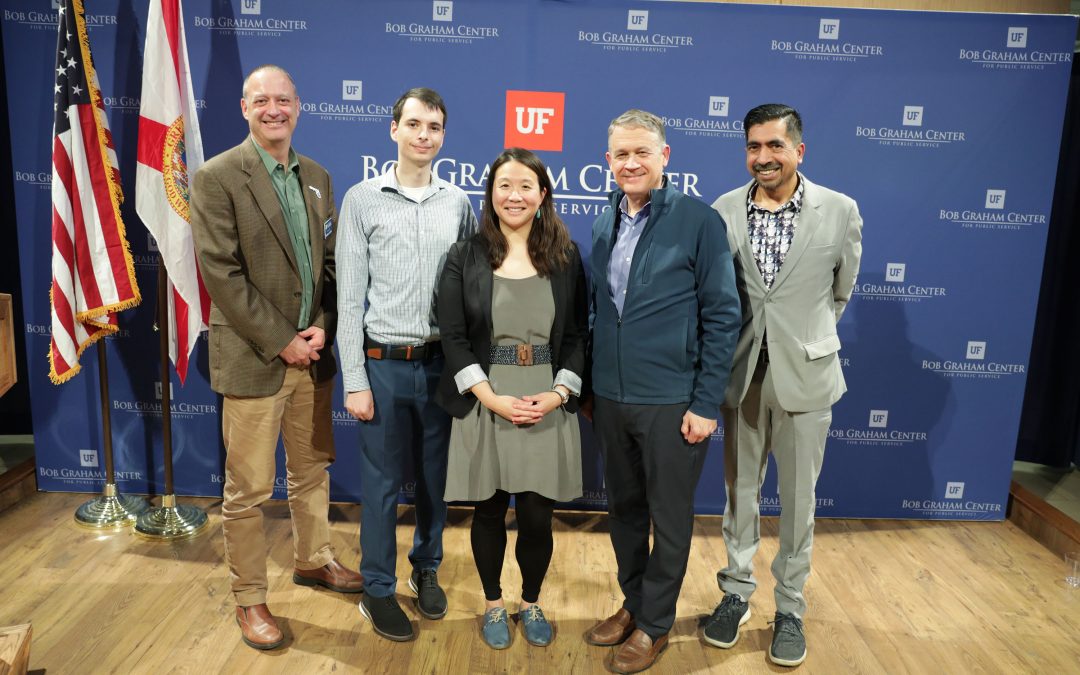AI is the latest gold rush
Artificial Intelligence (AI) has sparked a technological gold rush.
On February 6, graduating senior Brett Posner-Ferfman (BA ’24, BS ’24) moderated a panel on the intersection of AI, business and journalism. The panel featured Jack Faricy Professor and Director of the Business Analytics and Artificial Intelligence Center Jim Hoover, Professor of Journalism and Director of the Media Effects and Technology Lab Sriram Kalyanaraman and the University of Florida’s inaugural Business Journalist in Residence, Jess Jiang, an Emmy-winning journalist and editor of NPR’s economics podcast, Planet Money.
Right away, the panel discussion launched into the latest on how AI is impacting journalism, businesses and the workforce at large. When ChatGPT was launched in 2022, Hoover described, every industry latched onto the potential of AI and wanted to use it. But while many companies had the motivation to pick up the software, a lot of them lacked the vision for how they were going to use it. Now, the companies that got in on this goldrush are becoming discouraged by their lack of ROI. To make AI start to work for them, they first have to figure out how to make it work.

Finding AI’s role in the workplace is one of the main conundrums companies are dealing with as they experiment with the new technology. Over at Planet Money, Jiang says the podcast has been testing AI’s productivity against their staff. While the software works quickly, the quality of its content has room for improvement.
“We’ve done this a bunch at Planet Money, where we try to understand a tool by using it,” she described. “We made an entire episode that was essentially made from AI and played it for people. One of the funny responses was, okay, I’ve listened to many first drafts in my time at Planet Money and this was not actually that bad of a first draft.
“There were still terrible parts to it, like if you listen to the show there’s laughter in it [from a synthetic character] and it’s the creepiest thing you’ve ever heard – no human should make that sound, because it’s not a human making that sound. So it’s sort of this range of feeling both like, it’s okay that AI is here and it can’t quite replace me yet, so I’ve got a couple years left, but it’s not bad for just being around for six months.”
Wondering whether AI will replace them at work is the number one question Jiang gets asked by college students. But Hoover notes that all rising technology is met with suspicion – even the invention of the printing press, back in its day, was seen as a threat. With so much unknown, the panelists agreed that it’s important to focus on regulating the rising technology and to be aware of its broader impact – though hopefully not at the cost of stifling innovation, Kalyanaraman added.
“We’re sort of in a world where there are two paths in front of us, [and] it could be one of two paths or somewhere in the middle, to be honest,” Jiang said. “AI could become this force of good, this tool used to compliment work [and] maybe rebuild the middle class.
“There’s also the potential that it could be more like the industrial revolution where it really put artisans out of work. There are these two worlds that could exist and maybe they’ll coexist and it’s sort of an interesting moment to think about can we help define where we go, are there things we can do now.”

“There’s a lot of research indicating that AI plus humans are better than humans and they’re better than AI alone,” Hoover said. “Currently, we’re in the infancy stages of the implementation of AI. ChatGPT version 3.5 or 4.0 is not as good as version 20 is going to be.
“It’s really up to us and to companies and creatives to figure out how best to use this tool. I believe it’s going to help us more than hurt us. It definitely has the potential to hurt us, but I think it could be a good thing.”
To hear more of the panelists thoughts on regulating AI, including managing bias and establishing credibility to combat “deep fakes,” watch the full recording of the discussion.




